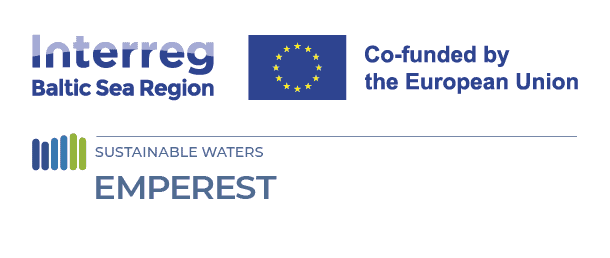
EMPEREST goes to Malmö to discuss local strategies and solutions against PFAS and micropollutants
10 October 2025
The workshop was organized in collaboration with the Swedish Environmental Research Institute IVL. The Baltic Sea PFAS Network Coordinator from IVL, Mayumi Narongin Fujikawa, was the moderator of the event.
The workshop was opened by Per-Arne Nilsson, Senior Environmental Strategist of the City of Malmö, Associated Organisation of the EMPEREST project. Per-Arne explained the historical background of the work against hazardous chemicals within the City of Malmö. Prevention work and awareness raising are ongoing in many sectors of the city administration and among inhabitants. Regarding removal, Malmö and neighboring municipalities are currently building a new joint wastewater treatment plant which will have a strong capacity for removing toxic chemicals from the water cycle.
The problem and the solution
In the presentations, given by EMPEREST experts Markus Raudkivi (HELCOM Secretariat), Kamila Gruškeviča (Riga Technical University) and Piia Leskinen (Turku University of Applied Sciences) and in the following panel discussion involving the speakers and also Linda Önnby (IVL), topics ranged from current status of PFAS problem to solutions and governance. Indeed, the current status is, simply put, that PFAS are everywhere. Water and biota samples in the Baltic Sea Region almost all contain PFAS – perhaps excluding reindeer in Swedish mountains. However, the EMPEREST PFAS monitoring guidelines (project output 2.1) show that concentrations are diminishing for those PFAS compounds that have been banned earlier. Continuous and systematic monitoring of the situation is needed in order to measure the results of the work against PFAS.
 Markus Raudkivi introducing the EMPEREST work on regional PFAS monitoring. Photo by Mariia Andreeva.
Markus Raudkivi introducing the EMPEREST work on regional PFAS monitoring. Photo by Mariia Andreeva.
One of the solutions proposed by the EMPEREST project is the PFAS risk assessment tool (project output 2.2) featuring an interactive Excel tool for local authorities with which they can start identifying PFAS pollution hotspots in their city and mitigating the risks. The end-of-pipe solution strengthened by the EMPEREST project is the removal of PFAS and other organic micropollutants from the water cycle at the wastewater treatment plant. The report on strategies and technological means for minimising organic micropollutants (project output 2.3) presents the results of the technology pilot studies carried out at six different wastewater treatment plants in the Baltic Sea Region – studies driven by the update of the EU directive on urban wastewater treatment, imposing new requirements on the removal rates of micropollutants. Other solutions mentioned in the workshop included public procurement as a tool in the toxic-free market transition.
Finally, in the discussion about governance of the management of PFAS pollution, the importance of local level was highlighted. While national-level politics may currently focus strongly on security and other pressing issues, the work against PFAS pollution at municipal level is gaining importance. Many cities are building their PFAS strategies and action plans. Research is strongly used to make informed decisions. We also heard encouraging examples of effective collaboration between municipal politicians and city administration. At local level, actors understand the importance of protecting human health through ensuring our drinking water or kindergarten buildings are toxic-free. However, it was stressed that the collaboration between different units within city administration is not always straightforward on the topic of PFAS or other hazardous substances. Despite the barriers, the experts had an optimistic view of the future: awareness is raising, and people are starting to ask for PFAS-free products.
 Local action panel of experts. Photo by Mariia Andreeva.
Local action panel of experts. Photo by Mariia Andreeva.
Enhancing collaboration
In addition to EMPEREST, the event was also an opportunity to get to know other projects working with the PFAS problem. Michael Cimbritz from the University of Lund presented the LIMIT project funded by Interreg South Baltic which focuses on removing PFAS from wastewater and hotspot areas with sustainable technologies. Bo Hjälmefjord from the County Administrative Board of Stockholm presented the BalticPFASResolve project funded by the Interreg Central Baltic programme. In this project, focus is on identifying pollution hotspots, testing stormwater treatment solutions and promoting PFAS-free options at firefighting services.
 Organisers, speakers and supporters of the workshop. Photo by Olena Zinchuk.
Organisers, speakers and supporters of the workshop. Photo by Olena Zinchuk.





